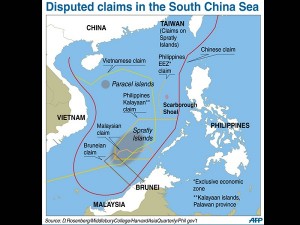China to keep ships around Scarborough Shoal for ‘law enforcement’
Chinese government vessels will remain “on guard” near the disputed Panatag (Scarborough) Shoal in the West Philippine Sea (South China Sea) “based on the needs of onsite law enforcement, management and service,” according to China’s foreign ministry.
Liu Weimin, the ministry spokesperson, posted this statement over the weekend after the Philippines reported the “repositioning” of vessels of both countries to “deescalate tensions” at the disputed shoal.
But Liu said “Chinese fishing boats are operating normally in the lagoon free of disturbance and Chinese vessels are continuing their management and service for the Chinese fishing boats and fishermen in waters off Huangyan Island.”
China refers to Scarborough Shoal as Huangyan Island.
“China does not hope to see any more provocative behavior that hurts China’s rights and interests,” Liu added.
She also said Beijing was “continuing its communication with the Philippine side on how to properly handle the Huangyan Island incident and improve bilateral relations.”
The Philippines calls the disputed rock formation Bajo de Masinloc.
“Since April 10 when Philippine warships harassed Chinese fishermen, which caused the Huangyan Island incident, while making solemn representations with the Philippine side, China has also sent government vessels to the area for regulation, which made the Philippine side withdraw most of its ships, except for one government vessel still left in the lagoon,” Liu said.
She said “the remaining (Philippine) vessel finally left the lagoon on June 3.”
According to Liu, the disputed shoal “has a fragile ecology in the lagoon and China seldom allows large ships to carry out activities inside it.”
“China sent as necessary two government vessels to the lagoon on May 30 to clear the area after the withdrawal of Philippine government vessels. The two Chinese vessels left the lagoon after the completion of the mission on June 5,” she said.
Philippine side
Last week, the Department of Foreign Affairs (DFA) reported that government vessels from both the Philippines and China had moved out of an area in the shoal.
Raul Hernandez, the DFA spokesperson, said China had moved out two government ships from the shoal’s lagoon while a research ship from the Philippines’ Bureau of Fisheries and Aquatic Resources did the same.
However, there are “still 30 Chinese fishing vessels inside (the lagoon),” Hernandez said. There were no Filipino fishermen in the area, he added.
Manila and Beijing have been facing off around the shoal since April, when Chinese ships blocked Philippine vessels sent to arrest Chinese fishermen poaching in the lagoon.
Presidential spokesperson Edwin Lacierda said the repositioning of the Philippine and Chinese vessels would eventually ease the standoff in the shoal.
He told reporters “this is an easing of tensions and we appreciate the gesture of both parties to deescalate tensions in Panatag Shoal.”
Armed Forces of the Philippines Chief of Staff General Jessie Dellosa declined to comment, saying it was the DFA that was authorized to speak on the matter.
“What I know is the situation is deescalating so let’s leave the secretary of foreign affairs to speak on the matter,” he said.
Dellosa said the pullout of the BFAR vessel was not a sign the Philippines had given up its claim on Panatag Shoal.
Assert our claim
“We are asserting our claim on Panatag Shoal. We should not give that up, that is ours,” the chief of staff said.
Dellosa, however, stressed that “as much possible we have to resolve this by peaceful means, by very diplomatic means.
Meanwhile, Vice President Jejomar Binay said Philippine-China relations remained intact despite “twists and turns” in the ties.
In a speech Saturday commemorating Filipino-Chinese Friendship Day at Century Park hotel in Manila, Binay said “no friendship shall ever be perfect.”
“There will be tests and challenges, and our shared path has been and will continue to encounter twists and turns,” he said.
According to Binay, “there are those who would be quick to look at the obstacles along that road and plead with us to abandon the voyage altogether.”
“But the richness of our past gives us the certainty that all things can be settled, not just peacefully, but justly between friends,” he said.
In his remarks, which cited the 37th anniversary of the establishment of Manila-Beijing ties, Binay called on the two neighbors to “invigorate our kinship.”
The Vice President noted that trade remained a main avenue of cooperation between the two countries. China is also the Philippine’s second largest source of overseas development assistance.
“(I)t is with China more than any country in the world that the Philippines has signed the most number of trade, economic, cultural, scientific and technological agreements. With a report from Dona Z. Pazzibugan
Originally posted on Jun 10, 2012 @ 9:08 p.m.
